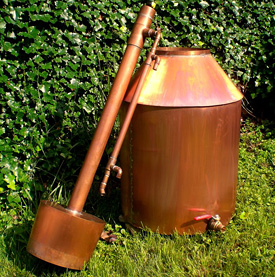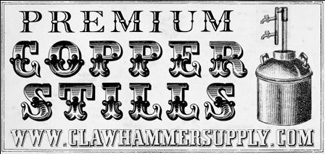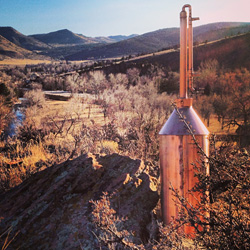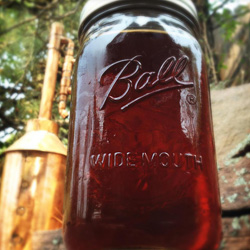Clawhammer Supply and The Art of Copper Distilling
 Copper still from Clawhammer Supply.
Copper still from Clawhammer Supply.Photograph courtesy of Kyle Brown
Copper stills and moonshining go together like white lightning and a mason jar. And, since 2009, Kyle Brown, the founder of Clawhammer Supply, has been bringing the old time art of moonshine making back to the forefront with his handcrafted copper stills.
Brown's still building days began when he was living in Asheville, North Carolina working as a construction consultant. He was inspired to build a still by a friend that had learned to distill from his father and grandfather. Already a homebrewer, distillation seemed like a logical new hobby, but when Brown searched out a traditional copper still to purchase, he discovered that there were very few available on the market. So, he set out to make one himself.
After purchasing the sheet copper he needed to make his first one, he soon realized he actually had enough material for three stills, so he decided to build two more to sell and help pay for his still. That's when Brown realized that he had just as much fun still building as distilling and decided create a side business of manufacturing copper stills.
Brown co-founded the company with his friend Tom Smith, and named it Clawhammer supply after a style of banjo playing in which the fingers are used to pluck or "claw" at the strings and the thumb is used to pluck or "hammer" on the top string of the banjo. In the first year, they sold only finished stills but soon found themselves swamped with work by Christmas. To help meet demand, the began producing still kits in order to save time in manufacturing.
Selling kits has another advantage; federal law mandates that still manufactures provide the names of their customers if requested. Sellers of still kits however, are not obligated to provide the names of their customers. As one might expect moonshine still manufacturers must skillfully navigate a variety of state and federal laws in order to sell their product. Shortly after opening Clawhammer Supply in North Carolina, Brown discovered that the laws regarding still production in that state are somewhat ambiguous. In order to avoid potential legal problems Clawhammer Supply relocated across the border to Tennessee where it was clearly legal to manufacture still kits.
 Premium Copper Stills. Clawhammer Banner Ad.
Premium Copper Stills. Clawhammer Banner Ad.Photograph courtesy of Kyle Brown
In late 2010 Kyle Brown purchased Tom Smith's half of the business and moved Clawhammer Supply to Boulder, Colorado. In 2011, the Discovery Channel TV show Moonshiners went on the air, which Brown says was a "big windfall" for Clawhammer.
At the beginning of 2013 Brown was able to quit his day job and make a full time living from Clawhammer Supply. In addition to Brown, Clawhammer Supply now supports two part-time employees.
"Perfecting our manufacturing system was one of his biggest lessons of the last four years," he says. "It takes us half as much time to make a still as it did a year ago."
Today, Clawhammer Supply subcontracts with a machinist who manufactures the still parts and ships them back to Clawhammer to be packaged as kits.
According to Brown, the term moonshine goes back to the days of Prohibition, when home distillers would make liquor in the woods at night. True moonshine is made with mostly corn and some malted barley. When it comes out of the still it is clear and can also be referred to as white whiskey.
"I'm surprised that more people are not distilling," he says. "Home distillation or 'moonshining' has become increasingly popular partially because of the Discovery Channel Moonshiners TV series and also because home distillation is a natural progression from home beer and wine making, both of which have become increasingly popular in recent years."
 Copper still from Clawhammer Supply.
Copper still from Clawhammer Supply.Photograph courtesy of Kyle Brown
Copper is the preferred material for traditional moonshine stills, and Brown purchases the majority of his materials from Revere Copper Products in Rome, NY. Sulfides, a natural by-product of fermentation, are concentrated during distillation and can cause off flavors as well as contribute to nasty hangovers. Copper helps to removes sulfides from the liquor resulting in a better tasting product. Brown recommends using copper mesh in the chambers of his still to act as scrubbers to further remove sulfides. In addition to being a great thermo-conductor, copper is also malleable and easier to work with than stainless steel. To stop the formation of verdigris, which can be toxic, Brown always cleans his copper stills with hot water and dries them, sometimes also using vinegar if the still is very dirty.
Although the laws regarding home distillation vary both on the federal and on the state level, Brown says that it is legal for him to ship his still kits to any state.
"We just sell copper---you would have to apply the same laws to any plumbing supply store," he says. "It is the responsibility of the purchasers to be familiar with federal, state and local laws before purchasing a moonshine still kit."
On the federal level there are two types of permits that would allow an individual to own a still. The Federal Distilling Permit is used primarily by large professional distilleries like Jack Daniels. The process for getting a Federal Distilling Permit can be long and expensive. Instead, many home still owners opt for the Federal Alcohol Fuel Producers' Permit. This permit is much cheaper and easier to get than the Federal Distilling Permit. Nonetheless, the Federal Alcohol Fuel Producers' Permit is intended for individuals making vehicle alternative fuels such as bio-diesel and will not protect you if you get caught with a pantry filled with moonshine.
But still, Brown insists that moonshining is no more dangerous than many hobbies.
"If you follow your safety procedures the chances of something going wrong are very low," says Brown. "There should be a home whisky distillation license similar to a driver's license that teaches responsible and safe distillation."
 Moonshine with still.
Moonshine with still.Photograph courtesy of Kyle Brown
Brown always does his distillation outside and uses an electric burner to reduce the dangers of fire. Distillation takes about six to ten hours, and the quality of the alcohol produced changes during the process. Moonshiners classify the alcohol produced in four categories--the first part is the "forshots", followed by the "heads", then the "hearts" and ending with the "tails". The "forshots" contain toxic alcohols and oils such as methanol and must be discarded. The "heads" and "tails" are lower quality spirits that have a reputation for causing hangovers. The "hearts" contain primarily ethanol and are the most prized moonshine for drinking.
Brown built his stills to be versatile and to have the potential of producing a variety of spirits. There are many different types of traditional copper stills but usually a reflux still is used for distilling neutral spirits like vodka while a pot still is used for distilling whisky. Clawhammer Supply stills combine some of the features found in both a pot still and a reflux still, making it acceptable for distilling a wide range of spirits.
It is reasonable to believe that public interest in home distillation will continue well into the future. Brown enjoys the social aspects of selling to a diverse and unique customer base.
"It is a fascinating group of folks that we interact with," he says. "You certainly see an interesting cross section of America. We have had everyone buy stills from us, from auto mechanics and school teachers to lawyers---even the CEO of a publicly traded company recently purchased a still. And, they are all as interesting as heck to talk to."
Resources:
Also in this Issue:
- Clawhammer Supply and The Art of Copper Distilling
- Racing to the Goal: The Bronze Expressions of Mike Tabor
- West Coast Native American Inspirations Speak in Copper Jewelry
- Cape Fear Copper Shop: Pure American Copper, Water Fired to Create Beautiful Artwork
- Crystal Bridges Museum of American Art adds works by Warhol, Judd and Others to Collection
